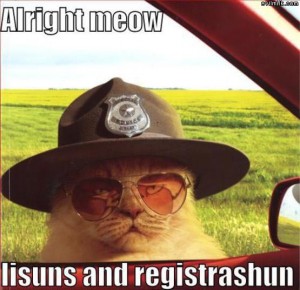Arrests and Car Searches: When Can Police Do Either?
Let’s say you’re rolling down the street in your Firebird, one arm on the wheel, the other sippin’ on gin and juice. And right before you are about to lay back, you suddenly see flashing blue and red lights in your rear view mirror followed by the dreaded siren and the phrase, “Pull over.”
Nerve-racking scenario, huh? One that I hope is unfamiliar territory to the majority of you. Though if you fall into the minority who have experienced something like this or at least are afraid that you may one day, would you know what to do next?
Before you answer, think carefully. Driving under the influence is a serious charge. Being convicted of one means not just the potential for jail time, a fine, probation, and criminal record, but also a huge bump to your insurance premiums.
Frozen in fear over this horrible real life “Choose Your Own Adventure” book? Well don’t be, because you’ve come to the right place if you’re looking for answers to all your most pressing police search questions.
First, let’s start with the answer to the question I posed at the beginning of this post – what do you do next? In a scenario like this one it really depends on what the police did or didn’t see.
Option 1: If the police saw you holding a bottle labeled “gin and juice cocktail” in your hand. You, upon seeing the cop, chuck the bottle under the seat before pulling over. Once stopped, the cop approaches your vehicle and asks you for your license and registration, and subsequently smells booze on your breath. At this point the cop would then have authority to place you under arrest for suspicion of DUI.
The reason he may do so is due to a legal term call “probable cause.” Basically this is the standard used by police to determine when they can arrest a person for a crime. Probable cause is established by considering two factors: 1) the veracity of knowledge (accuracy) and 2) the basis of knowledge (reliability). In the case above, because the cop saw you drinking out of a marked liquor bottle and smelled booze on your breath, chances are the cop can be pretty damn sure his knowledge basis for probable cause is both accurate and reliable to justify an arrest.
Option 2: So how about if he didn’t see or smell alcohol? Then unless you admit you were drinking or consent to a breathalyzer, the cop would have no probable cause to arrest you.
But let’s assume you’re caught because the cop can smell or see alcohol – what then? Luckily, it’s still not over yet. That’s because fortunately our criminal justice system requires evidence to convict people. At this point, the logical question then becomes whether the cop can search your car. Once again, the answer can vary. Before 2009, any cop could search the entire passenger compartment of your vehicle after a conducting a lawful arrest, except a closed trunk. That’s because under the old law, the justification was that police could do this in order to prevent suspects from grabbing weapons or destroying evidence that was in the car. This was coined as searching a suspect’s “grabbing area.” Basically anything within the suspects reach could be searched.
 Recently, however, the U.S. Supreme Court ruled under a case call Arizona v. Gant that such searches weren’t allowed as a violation of the US Constitution. But this doesn’t mean that searches of cars after any arrest aren’t allowed anymore; it just means that there’s a new rule to do it.
Recently, however, the U.S. Supreme Court ruled under a case call Arizona v. Gant that such searches weren’t allowed as a violation of the US Constitution. But this doesn’t mean that searches of cars after any arrest aren’t allowed anymore; it just means that there’s a new rule to do it.
Now, in order for police to search your vehicle without a warrant, a suspect must either be 1) under arrest, but unrestrained and still in physical grabbing distance to the car or 2) be arrested for circumstances that would warrant a search. The latter mean that if you were arrested for drug possession, then your car can still be searched because there may be more drugs in it. However, if you’re arrested for speeding, then a search wouldn’t be allowed because there wouldn’t be any evidence of your speeding that could exist in the car.
Also a quick caveat: a pat down search after an arrest is always legal. And if a cop asks you if they can search your car and you agree, those searches are always legal, too. It never ceases to surprise me how many people let cops search their cars when asked. You have rights people: please use them.

Comments